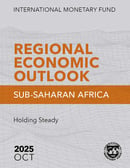This web page provides information in on the activities of the Office, views of the IMF staff, and the relations between The Gambia and the IMF. Additional information can be found on The Gambia and IMF country page, including official IMF reports and Executive Board documents in English and French that deal with The Gambia.
At a Glance
- Current IMF membership: 191 countries
- The Gambia joined the Fund in September 21, 1967. The Gambia accepted the obligations under Article VIII, Sections 2(a), 3, and 4, of the Fund’s Articles of Agreements on January 21, 1993. It maintains an exchange system that is free of restrictions on the making of payments and transfers for current international transactions.
- Quota (SDR): 62.2 Million
- Outstanding Purchases and Loans (SDR): 97.76 million (December 31, 2023)
- Article IV/Country Report: December 18, 2023 Country Report No. 24/15
Office Activities
IMF Resident Representative, Mamadou Dioulde Barry, presenting recent economic developments in SSA and The Gambia; and informing the audience about IMF supports to the country.
June 15, 2021
Gambia Advertisement for the Office Manager Position
November 13, 2020
Launching of the April 2019 Regional Economic Outlook (REO)
Power Point Presentation held at the University of the Gambia
June 10, 2019
DMD Tao Zhang Concludes his Visit to The Gambia
Press Review (articles and videos)
May 15, 2019
IMF's Work on Gambia
No results found. Either there was an error with the web service or there is no data returned by the web service.
Regional Economic Outlook
October 16, 2025

The outlook for Sub-Saharan Africa is showing resilience, despite a challenging external environment with uneven prospects in commodity prices, still tight borrowing conditions, and a deterioration of the global trade and aid landscape.
Read the Report
Fraudulent Scam Emails Using the Name of the IMF
For more information please see Fraudulent Scam Emails Using the Name of the IMF
Departmental Papers on Africa
 The Departmental African Paper Series covers research on sub-Saharan Africa conducted by International Monetary Fund (IMF) staff, particularly on issues of broad regional or cross-country interest. The views expressed in these papers are those of the author(s) and do not necessarily represent the views of the IMF, its Executive Board, or IMF Management.
The Departmental African Paper Series covers research on sub-Saharan Africa conducted by International Monetary Fund (IMF) staff, particularly on issues of broad regional or cross-country interest. The views expressed in these papers are those of the author(s) and do not necessarily represent the views of the IMF, its Executive Board, or IMF Management.



